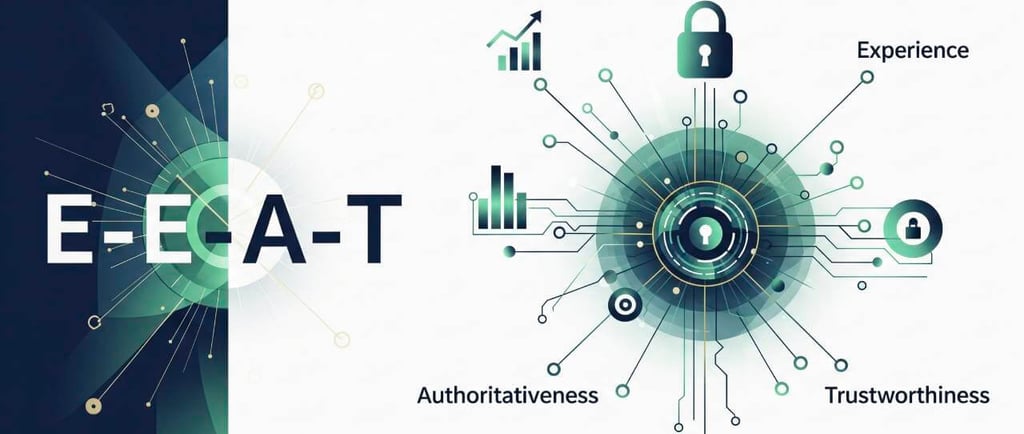Google E-E-A-T: What It Is & How to Build Credibility
Learn what E-E-A-T means for SEO success. Get practical strategies to improve your website's Experience, Expertise, Authoritativeness, and Trustworthiness for better Google performance
SEO


Google now cares more about content quality than ever before. Random blog posts and thin content no longer work. Search engines want to show users helpful, trustworthy information.
This shift brought E-E-A-T to the spotlight. Google uses these four principles to judge content quality. Understanding E-E-A-T helps your website rank higher and build real trust with visitors.
This guide explains what E-E-A-T means. You'll learn why it matters and get practical steps to improve your website's authority and trust signals.
What is E-E-A-T? Breaking Down the Acronym
E-E-A-T stands for Experience, Expertise, Authoritativeness, and Trustworthiness. Google added "Experience" to the original E-A-T framework in December 2022.
Experience
Experience means first-hand knowledge of a topic. Someone who has actually used a product or lived through a situation brings real value.
Examples of experience include:
A chef writing about cooking techniques they use daily
A parent reviewing baby products they bought for their child
A traveler sharing tips from places they visited
A cancer survivor discussing treatment options
Expertise
Expertise refers to deep knowledge and skills in a specific field. This often comes from education, training, or years of work in an area.
Examples of expertise include:
A doctor writing about medical conditions
A financial advisor explaining investment strategies
A lawyer discussing legal matters
A certified mechanic reviewing car problems
Authoritativeness
Authoritativeness means recognition from others in your field. Other experts and industry leaders respect your work and opinions.
Examples of authoritativeness include:
Getting quoted in major publications
Speaking at industry conferences
Receiving professional awards
Having other websites link to your content
Being cited by academic researchers
Trustworthiness
Trustworthiness forms the foundation of E-E-A-T. Users must feel safe and confident using your website and following your advice.
Examples of trustworthiness include:
Secure HTTPS connection
Clear contact information
Transparent business practices
Accurate, fact-checked content
Proper privacy policies
Safe payment systems for online stores
Trust matters most among the four elements. Without trust, experience, expertise, and authority mean nothing.
Why E-E-A-T Matters
Google's mission is organizing the world's information and making it useful for everyone. E-E-A-T helps Google identify content that truly serves this mission.
The Search Quality Rater Guidelines use E-E-A-T to train human reviewers. These reviewers evaluate search results and help Google improve its algorithms.
E-E-A-T becomes especially important for YMYL topics. YMYL stands for "Your Money or Your Life." These topics can impact someone's health, safety, or financial well-being.
YMYL topics include:
Medical and health information
Financial advice and news
Legal guidance
Safety information
News about important events
Shopping and product reviews
Poor advice on these topics can seriously harm people. Google applies stricter E-E-A-T standards to YMYL content.
E-E-A-T and Google Algorithm Updates
Google doesn't use E-E-A-T as a direct ranking factor. Instead, it guides what Google wants to rank highly.
Recent algorithm updates reflect E-E-A-T principles. The Helpful Content Update rewards content made for people, not search engines.
Google's core updates often boost websites with strong E-E-A-T signals. Sites with weak authority and trust may see rankings drop during these updates.
The pattern is clear: Google wants to show users the best, most reliable information available.
How to Improve Your Website's E-E-A-T
Building E-E-A-T takes time and consistent effort. Here's how to strengthen each element:
Building Experience
Experience shows readers you've actually done what you're writing about. Don't just research topics online. Share what you've personally tried, tested, or lived through.
Here's how to demonstrate real experience:
Share personal stories and case studies
Include photos and videos of your work
Feature customer testimonials and reviews
Document your process and methods
Write about lessons learned from failures.
Demonstrating Expertise
Expertise means showing deep knowledge in your field. Unlike experience, expertise focuses on your formal education, training, and specialized skills. You need to prove you understand complex topics better than average people.
Here's how to showcase your expertise effectively:
Create detailed author bio pages
List your credentials and certifications
Publish in-depth, well-researched content
Cite reliable sources and studies
Answer questions thoroughly and accurately
Guest post on respected industry sites
Establishing Authoritativeness
Authoritativeness means other people in your industry recognize you as a trusted voice. This isn't something you can claim about yourself. Others must acknowledge your expertise and cite your work. Building authority takes time and consistent effort.
Here's how to build recognition in your field:
Earn high-quality backlinks from trusted sites
Get mentioned in industry publications
Speak at conferences and events
Win relevant awards and recognition
Collaborate with other respected experts
Build relationships with journalists and bloggers
Improving Trustworthiness
Authoritativeness means other people in your industry recognize you as a trusted voice. This isn't something you can claim about yourself. Others must acknowledge your expertise and cite your work. Building authority takes time and consistent effort.
Here's how to build recognition in your field:
Use HTTPS encryption for all pages
Display clear contact information
Write comprehensive privacy policies
Keep content accurate and up-to-date
Correct errors quickly when found
Use secure payment gateways for e-commerce
Show real customer reviews and ratings
Include "About Us" and team pages
What Happens When You Ignore E-E-A-T?
Ignoring E-E-A-T isn't just about missing opportunities. It actively hurts your website's performance and business growth.
Google's algorithms are getting better at identifying low-quality content and sites that lack credibility signals.
Lower search rankings: Google may not trust your content enough to show it prominently in search results.
Reduced organic traffic: Fewer people will find your website through Google searches.
Lost user trust: Visitors may question your credibility and leave quickly.
Algorithm penalties: Major Google updates could significantly hurt your traffic.
Competitive disadvantage: Sites with stronger E-E-A-T will outrank you for important keywords.
Wasted content investment: Time and money spent creating content won't deliver results.
Key Takeaways
E-E-A-T isn't just another SEO trend. It represents Google's long-term direction toward quality and user value.
Building genuine E-E-A-T takes time, but the results last longer than quick SEO tricks. Focus on creating real value for your audience.
Remember that trustworthiness underlies everything else. Without trust, your experience, expertise, and authority won't matter to users or Google.
E-E-A-T works best when it reflects reality. Don't try to fake these signals. Instead, build genuine expertise and authority in your field.
Lower search rankings: Google may not trust your content enough to show it prominently in search results.
Reduced organic traffic: Fewer people will find your website through Google searches.
Lost user trust: Visitors may question your credibility and leave quickly.
Algorithm penalties: Major Google updates could significantly hurt your traffic.
Competitive disadvantage: Sites with stronger E-E-A-T will outrank you for important keywords.
Wasted content investment: Time and money spent creating content won't deliver results.
Take Action: Audit Your E-E-A-T Today
Start improving your website's E-E-A-T signals today:
Review your author bio pages and credentials
Check that your site uses HTTPS everywhere
Update contact information and privacy policies
Identify opportunities to show real experience
Plan content that demonstrates your expertise
Need help building your website's authority and trust? Contact OLJMedia for content strategy that will boost your online credibility and search rankings.
